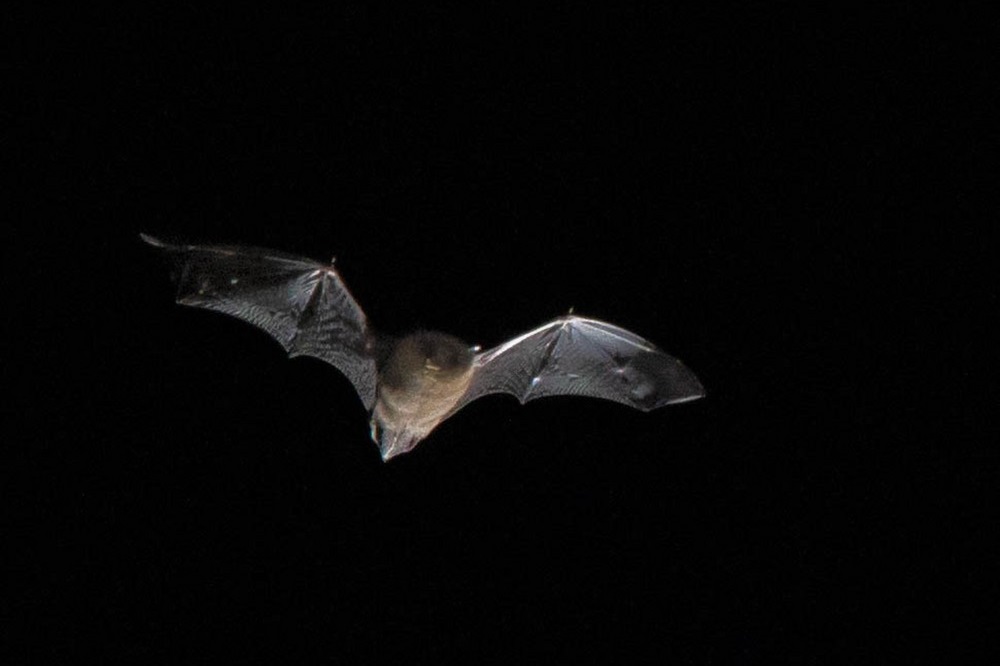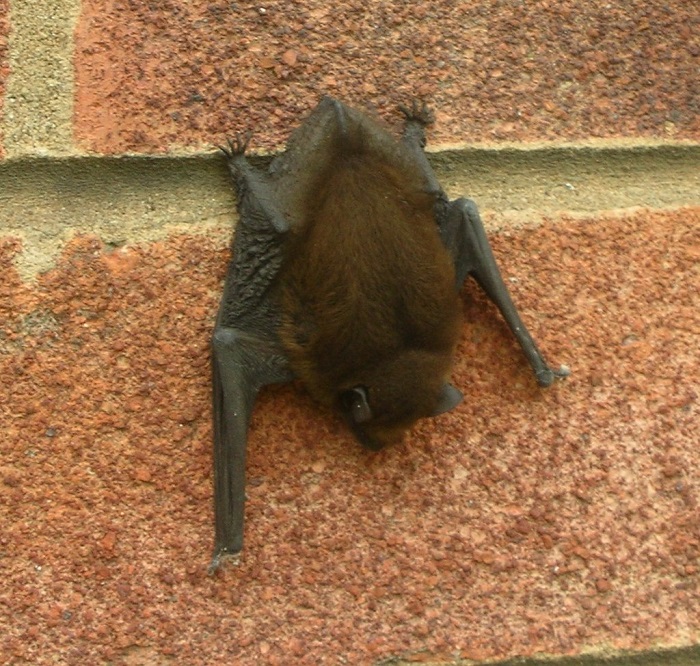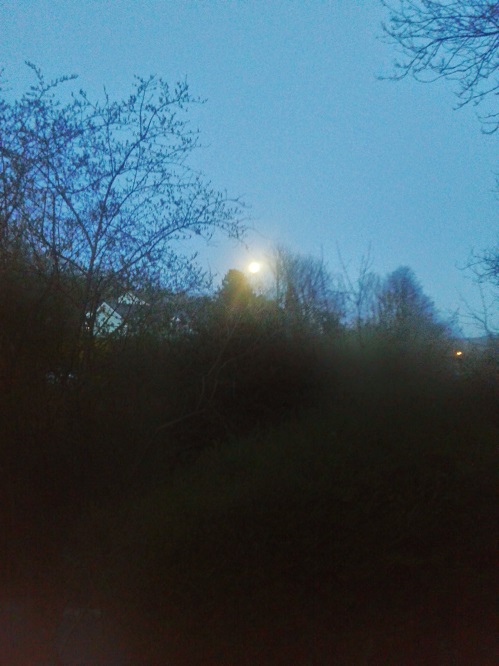Bat Watch: Tawny Clark soothes both body and mind on a bat survey at dusk

Tawny Clark
My eyes scan across the ridgeline and back, along the apex and soffits, and sweep over the tiles; before returning once again to the ridgeline.
I’ve learnt to focus my attention on the cracks, the imperfections, the tiny, minute edge-lands where un-whispered secrets may reveal themselves. Unseen bats might well be slumbering somewhere above me.
Regular roof dwellers like Common and Soprano pipistrelles (Pipistrellus pipistrellus and Pipistrellis pygmaeus) are the most likely to be found here. Quietly, they utilise the narrow, wafer-thin gaps which exist in and around our busy human lives. But these gaps? That’s why I’m here.
Over the roof, delicate wisps of cirrus cloud curl like giant upturned waves, and I long to let my mind wander into the soft, heavenly pink blush of sky.
A vast clamour of rooks abruptly fills the air with an ominous, cluttered darkness. They pass noisily overhead, towards the waning glow, as the sun sinks heavily into the sea. My eyes return to the roof. It’s twenty minutes until sunset and time to get to work.
A methodical, systematic, attentiveness is required. I slow my eyes over the most notable features, the potential entry points, slipped tiles, nooks, crannies, glitches. I observe them more closely during each scan of the roof, whilst remaining on high alert for any movement in my peripheral vision.
An understanding of bat ecology and habitat requirements is vital. And it helps to know the glossary of architectural terminology – which enriches the pre-survey discussion with soffits, stepped flashing, abutments, barge boards, gable ends, and my favourite, the Gothic flying buttress.
With dusk surveys you can familiarise yourself with the roof in daylight. I’ve already determined the path my eyes will take repeatedly over the next couple of hours. I’ll vary my pattern, obviously. I’m not a machine. I need variety, randomness. I’m only human.
Memorable
Patience is needed to cope with the boredom that inevitably comes with hours of inactivity – which is likely here, looking at this roof. Although, my years of experience have taught me never to assume, or rule out, anything. I don’t mind a lack of excitement; it makes those moments when something truly remarkable does come to pass even more special, more memorable, for their rare occurrence.
Last time I was here, at dawn that time, a robin nearly alighted on my shoulder. In the corner of my eye, I’d seen an object approaching at speed and instinctively turned my head. He banked impressively, like a diminutive fighter jet engaged in aerial combat, and landed instead on the lawn nearby. He cocked his head and narrowed his eyes at me half curious, half annoyed that his new perch had moved.
The light was diminished then and perhaps his eyes hadn’t recognised my hunkered mass as human; sitting as I was on a camping chair, beneath bobble hat and layers of weather-resistant jackets. I could have been an odd new garden ornament I suppose, an over-sized, over-dressed gnome, or just a mass of discarded coats at a party.
The blackbird, shortly afterwards, got closer still; almost severing my ear as he bombed past in the dimness. He didn’t care a jot whether I was gnome or person. He was obviously in a hurry to get on his way, like Alice’s White Rabbit.
Midges are plentiful this evening. They irritate and go for the eyes, but their abundance is a good sign. Bites are a small price to pay. They are a feast for the remarkable creatures I’m here to look for. If they weren’t here, bats wouldn’t be either. I suppose it’s one way to draw them in. Tonight, I am low down on this complex food web.
Thankfully, these invertebrates are here to fill the hungry tummies of the new bat-mothers, who give birth to a single, annual pup around June and July here in the UK.
Warm, dry summer evenings like this are crucial, especially after the endless rain we’ve had recently. Adverse, unseasonable weather can spell disaster for insects. It’s a precarious balancing act between life and death, especially now that there are more tiny mouths to feed.
Torpor
Bats enter torpor in periods of inclement weather. Reducing their body temperatures and lowering their metabolic rate helps them conserve energy and survive. Bats usually hibernate in winter, yet I’ve witnessed one fluttering around a roof very near to here, on an unseasonably mild, sunny day in January – in the middle of the day. It seems climate change has baffled our bats.
Bat mothers nurse their tiny, Lego Batman-sized pups with life-sustaining milk. They don’t get to rest right now. It takes a village to raise a child, and a colony to raise a pup. Communal maternity roosts become nurseries as mothers take turns to feed, leaving others to babysit the creche of pups. A sharing, caring, nurturing community. It’s a beautiful thing.
With so many rooves being converted, suitable maternity roosts are on the decline. Sadly, bats are seen as an inconvenience to many, a threat to some, and even feared by those who do not understand their enigmatic nocturnal ways.
Male bats are different. They like to cruise the club, hook up for a one-night stand – several – and move on. They roost alone, or in small bachelor roosts. Quite the uncomplicated life. Although, sometimes males can be found in maternity roosts. Daddy day-care?
Bats rest during the day and need shelter from hawk-eyed threats like gulls and birds of prey – notably owls. Domestic cats are a significant predator too, capable of wiping out a roost on a nightly prowl. Sometimes the tiny gaps in our modern world are just not safe enough.

I hope ravenous bats appear soon to slow the midge-feast of my face as I pull the bobble hat down over my brow and raise my scarf up over the bridge of my nose to minimise the bite-zone.
It’s early, and the birds are still competing for the loudest bedtime song. It’s more shouting than singing now. I don’t want to go to bed. I won’t brush my teeth. I’m not tired.
I’m tired. I’m ready for my bed. Today has been spent cleaning my father-in-law’s house, which is filled with the cruel realities of this Covid-tarnished year. The unnoticed side-effects of shielding, of lockdown, of isolation inhabit every room while he lies in a clinically clean hospital, cared for by our peerless, and exhausted NHS heroes.
We’ve stayed away to protect him, but loneliness, neglect, and a stubborn refusal to ask for help litter every surface. Each particle of stale air holds a different emotion, and it threatens to unravel the fraying knot of my heart.
This year has been tough for many, for most. We thought we’d done well to avoid testing positive, dodged a bullet, kept ourselves and our loved ones safe by keeping our distance and waiting for better times. But the impacts of Covid run deep. Just being with your loved ones in hospital, showing them you’re there, that you care, is no longer so easy and it makes me think of all those who’ve been through this too, or worse, this year. Any year. Every year.
Before this, our raft was piled pretty damn high, but we were starting to feel in some sort of control, some sort of balance. Just about. And now this Stroke has hit us like the waves in the upturned sky and sent us bundling towards the jagged rocks of an uncertain future.
The day’s fade dial has been set to imperceptible slowness, but now it calibrates for night and the woodlands hush. Except for the rooks, who chatter about their day, and odd peeps and whistles from unseen birds who insist on an encore.
For a moment, the world seems to settle. But it’s short-lived. There’s a flurry of activity nearby. Shouts and laughter from people somewhere. And sheep now, bleating in far fields. Good night springy lambs, with your legs too long.
A chaotic moth flutters past. It’s a sign that the creatures of the night have at last begun to replace their diurnal counterparts.
Just when I think the birds have settled, one starts up again, and then another. Enough already. Go to bed. You have an early start. Crows share a joke as they pass overhead. I think of the lambs and hope their mothers have them safely tucked away.
And there it goes. The twinkling fairy-like flutter of the first bat. It passes low, two metres in front of me. My handheld bat detector converts its high-frequency echolocation call into one I can hear. At 45 kilohertz, it’s a Common pipistrelle (Pipistrellus pipistrellus).
Call pattern
Most species of bat echolocate at different frequencies and, like birds, each species has a different call pattern. Using call characteristics, the eighteen species currently found in Britain can be identified. I have an Anabat beside me to record tonight’s bat calls but it’s entirely my responsibility to see whether a bat (of any species) comes out of the roof. That one didn’t.
It’s twenty-five minutes past sunset and the sighting of the first bat is a useful reference point for the survey. They are out now. Pay close attention. This bat came from somewhere very nearby. It’s not my concern now though. The scope for tonight’s survey has a clear focus. I have a singular task.
With experience comes the ability to write without looking – I suspect that’s why a lot of survey sheets are practically illegible. The bat and time are rapidly scrawled down. Any sightings are really a secondary concern to tonight’s burning question. Are bats roosting in this roof?
Two minutes later I catch a movement and glance at another bat, foraging high over the woodland, before returning my full attention to the roof. I pull my scarf off my nose so it’s easier to flick my eyes down to the survey sheet and check I’m scribbling in the right place. But they’re back on the roof in half a second.
The air has taken on a distinct coolness and I sniff as my exposed nose senses the drop in temperature. Darkness has begun to creep across the roof as another Common pipistrelle (Pipistrellus pipistrellus) accelerates past me.
Crows are still flying overhead forty minutes after sunset, and I’m distracted now by a bizarre sound. It’s very close, and alien to my experienced survey ears. It’s reminiscent of an unpleasantly moist, slobbery kiss. An unwelcome reminder of my teen years. There’s a carp pool a few metres away. The large fish have been quiet until this point, but now they seem eager to suck and squelch their huge lips against the surface of the water. I wonder if they can sense invertebrates who have inadvertently found their way onto the murky surface and are set to meet their demise.
The daylight vibrancy and lushness of the oaks and the beeches in the adjacent woodland have sapped into darker hues. Their shadowy canopies now belong to the menacing wildwood of the past.
Two more common pipistrelles forage across the lawn around me. My detector whirrs with ‘feeding buzzes’, blowing raspberries as the bats home in on their prey. This is serious science, but the toilet sound always amuses me – especially when I’m this tired.
The roof tiles resemble peaks and troughs of black sand, like those formed by the wash of an ebbing tide. They have the same glistening sheen which appears when the sun hits the wet sand at an angle. The diagonal patterns give the impression that the world has distorted, and I realise my head has unconsciously tilted as I scan the ridge tiles.
Milkshake
The carp snap me suddenly from my thoughts. The impolite slurp of a milkshake does not belong in this crepuscular world. You grow attuned to the familiar on a survey. Your brain quickly learns to zone out common sounds. It focuses on the unusual. The different. In the dimming light your other senses heighten and sudden, strange, loud sounds like this make me edgy.
There’s a flagpole behind me too, which clicks as the breeze knocks the metal ring against the pole. It’s not a common sound either, but it’s gentle and unobtrusive, with a lulling, nautical quality.
It’s impossible to pinpoint the moment it becomes dark, as the fading world disappears before me and around me the way the glistening mouth of an encroaching snail envelopes my runner beans.
The trees are silhouettes. Cardboard cut outs on a goose grey background, with pin prick stars poking through tiny holes in the fabric of space. I note a single star, low in the sky.
I focus on the diagonally ploughed lines of tiles. The roof is still; despite all the activity which has bustled around it this evening. There have been plenty of audible distractions, but my eyes have paid close attention to their task.
There are distractions still. Thumping and shouts from nearby. A yapping dog. But nothing of concern to me. I can sit peacefully and enjoy my quiet solitude.
Crap. A huge splash from the carp pool and my stomach lurches. I know I’m over-tired because my mind is racing and I’ve begun to imagine that these fish – who are out of sight just over my right shoulder –might morph into amphibious beasts and climb from the pool to grab me in the darkness.
An owl hoots. It’s distant and I hope it comes nearer, but I don’t hear it again.
The world is monochrome now. Whitewash houses nestle beneath blackened roofs, framed by the coal-like woodland beyond. Colour comes in yellowish glows which emanate from un-curtained living rooms dotted about the hillside. People sit in their houses, TVs on, relaxing with a glass of wine maybe. The TV’s been on in our house the last few evenings, but I’ve found myself staring vacantly through the screen.
It has not been a good time for anyone. We’ve weathered the year, but the brutal waves still crash over us. Life is throwing greater challenges at us than our withered reserves can take. Like the recent landslide nearby, I’ve felt at risk of crumbling into the sea.

Tonight is different. It’s a change from the typical mind-numbing evening routine. Out here, I notice everything. All my senses are being exercised. I’m drained, but alert. My brain seems grateful for this kind of stimulation. It recharges as I patiently wait.
The sky barely holds its faint bluish-grey tinge. The red dragon on the flagpole clings on proudly but will soon be swallowed up into the darkness too.
It’s late, and another bat, a Noctule (Nyctalus noctula), passes. It makes a slow ‘chop chop,’ sound through the detector. It’s different from the frantic, ‘argh everybody run,’ panic of the pipistrelles.
The roof is a black hole now. I can no longer see if a bat appears or not. It is unlikely, now, given the time. But I remain focused.
Argh. Amphibious monsters threaten again. I am jumpy, like the carp.
There are more stars now. I glimpse The Plough, or Saucepan. Venus is bright.
Although I am weary, tonight has helped to reset something internally. I feel more centred and balanced. The necessity of sitting quiet and still has helped to calm and sooth both my body and my mind. It has helped recharge my emergency reserves. Being given a singular task, a focus, and time alone with my thoughts, is I suppose like meditation. Mindfulness. It seems to have worked. Tonight has been the tonic I’ve needed in this difficult, uncertain time.
The freshness of the night air is the antithesis to the staleness of my day. It’s refreshing to inhale deeply then expel the dirt and sadness that has coated the bronchioles inside my lungs. The giant saucepan twinkles down from the clear night sky, and my head feels clearer now too.
For my final few minutes alone, I breathe slow and long. I will soon have to return to the worries and harsh, cruel realities of the human world. I am keen, however, to escape the aquatic devilry which has tainted my solitude tonight. The carp seem agitated. The surface sucking is more insistent, like a rockpool being repeatedly patted by a delighted child. Only out here in the dark, the sound seems much less innocent. It’s as though they can sense my imminent departure. Their time is running out. Can they taste me on the air as my fidgeting intensifies?
Even an unburdened brain has its limits and after staring at a black space for this long I’m always eager for it to end. No bats in the roof tonight. It’s a privilege to work with nature and tonight, more than ever, I am thankful for its sanctuary.
Support our Nation today
For the price of a cup of coffee a month you can help us create an independent, not-for-profit, national news service for the people of Wales, by the people of Wales.







Thank you for fifteen minutes of calm at the end of my day.
(Until the monster under the bed sucked its way out of the pond.)